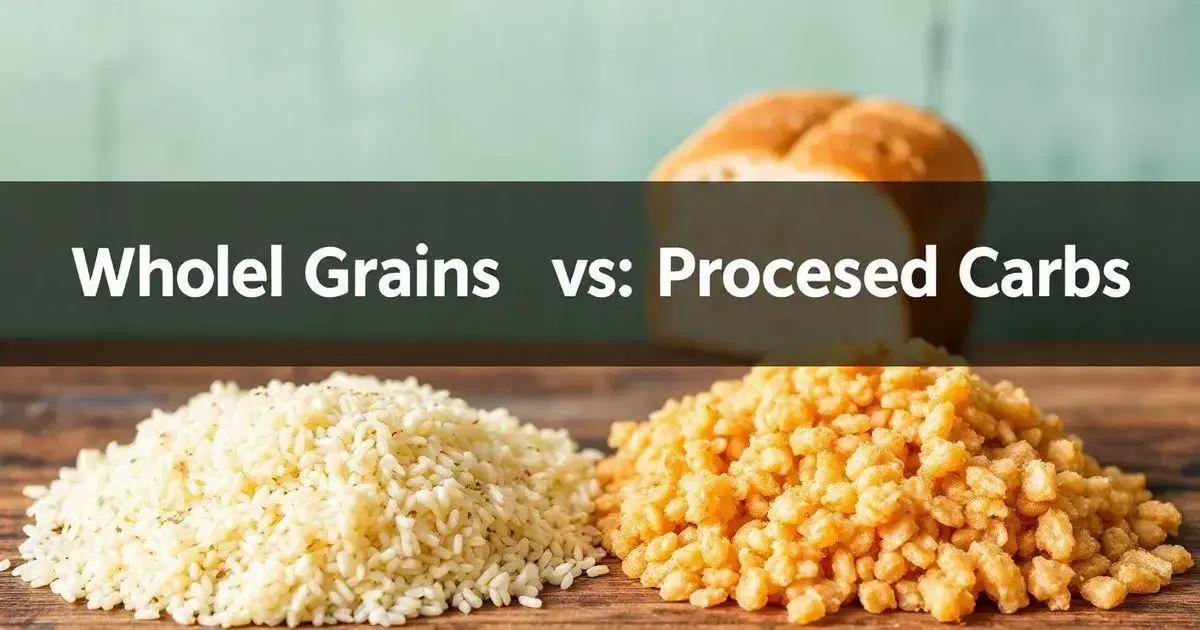Choosing whole grains over processed carbs is essential for better health. Whole grains provide vital nutrients and fiber, supporting digestion and heart health, while processed carbs can lead to weight gain and health issues. Incorporate whole grains into your diet by selecting whole grain products, making simple swaps, and enjoying a variety of whole grain foods for a balanced diet.
Choosing whole grains over processed carbs is a vital step towards a healthier lifestyle. Whole grains are packed with nutrients and fiber, making them an excellent choice for maintaining energy levels and supporting digestion. In contrast, processed carbs often lack these essential nutrients and can lead to health issues. In this article, we’ll dive into the distinctions between whole grains and processed carbs, explore their health benefits, and provide practical tips on incorporating whole grains into your diet.
Understanding Whole Grains vs. Processed Carbs

Understanding whole grains versus processed carbs is essential for making informed dietary choices. Whole grains include all parts of the grain kernel: the bran, germ, and endosperm. This means they retain important nutrients like fiber, vitamins, and minerals. Common examples of whole grains are brown rice, quinoa, barley, and whole wheat bread.
On the other hand, processed carbs often undergo significant refining, which removes the bran and germ, leaving primarily the starchy endosperm. This processing strips away nutrients and fiber, making these foods less healthy. White bread, pastries, and many snack foods fall into this category.
Why Whole Grains Matter
Whole grains contribute to a healthier diet by providing essential nutrients. They are high in dietary fiber, which supports gut health and helps keep you full longer. This can aid in weight management and reduce the risk of chronic diseases.
Identifying Whole Grains
When shopping, look for terms like ‘100% whole grain’ or ‘whole wheat’ on labels. In contrast, items labeled as ‘multi-grain’ or ‘enriched’ often contain refined grains. Always check the ingredients list to ensure whole grains are listed first.
A key takeaway is to choose foods that have less processing to maximize their health benefits. Incorporating a variety of whole grains into your meals can lead to improved nutrition and a healthier lifestyle.
Health Benefits of Whole Grains

Whole grains offer numerous health benefits that contribute to overall well-being. One of the most notable advantages is their high fiber content. Fiber is essential for good digestion, helping to prevent constipation and promote a healthy gut. Foods rich in fiber can also keep you feeling full longer, which aids in weight management.
Heart Health
Including whole grains in your diet can improve heart health. Studies show that whole grains lower levels of cholesterol and blood pressure, reducing the risk of heart disease. Whole grains contain antioxidants that help protect the heart by fighting free radicals in the body.
Blood Sugar Control
Whole grains are known to help regulate blood sugar. They have a lower glycemic index compared to processed carbs, which means they cause slower increases in blood sugar levels. This is beneficial for individuals with diabetes or those aiming to maintain steady energy levels throughout the day.
Reduction of Chronic Disease Risk
Regular consumption of whole grains is linked to a lower risk of various chronic diseases, including type 2 diabetes and certain cancers. The vitamins, minerals, and phytonutrients found in whole grains play a key role in reducing inflammation and improving overall health.
Incorporating whole grains into meals can lead to a healthier lifestyle, supporting long-term health and wellness. Options such as oatmeal, brown rice, and whole grain pasta can easily replace more refined options.
Tips for Incorporating Whole Grains

Incorporating whole grains into your diet can be simple and rewarding. Here are some practical tips to help you get started:
Start Your Day with Whole Grains
Begin your morning with a nutritious whole grain breakfast. Options like oatmeal, whole grain cereal, or whole grain toast provide a healthy start and keep you satiated.
Swap Refined for Whole
Make easy substitutions in your meals. Use brown rice instead of white rice or whole wheat pasta instead of regular pasta. These small changes can significantly increase your whole grain intake.
Add to Family Favorites
Enhance your favorite dishes by adding whole grains. Consider mixing quinoa or barley into soups and salads for added texture and nutrition. You can also use whole grain flour when baking.
Snack Wisely
Choose snacks that include whole grains, such as popcorn or whole grain crackers. These options are not only delicious but also provide that extra fiber your body needs.
Read Labels Carefully
Always check food labels when shopping. Look for items that list whole grains as the first ingredient. Avoid products that contain ‘enriched flour,’ as this means they have been processed.
By applying these tips, you can easily incorporate whole grains into your diet, enhancing both flavor and nutrition in your daily meals.
Common Misconceptions about Carbohydrates

There are many misconceptions about carbohydrates that can lead to confusion when it comes to healthy eating. Let’s clear up some of the most common ones:
All Carbs Are Bad
One of the biggest myths is that all carbohydrates are unhealthy. In reality, carbohydrates are a crucial source of energy. Whole grains, fruits, and vegetables provide essential nutrients and should be a part of a balanced diet.
Carbs Make You Gain Weight
Many people believe that eating carbs leads to weight gain. However, it’s not just carbs but the overall diet and lifestyle that matter. When consumed in moderation, healthy carbohydrates can help maintain a healthy weight.
Processed Carbs Are the Same as Whole Grains
Some think that processed carbs, such as white bread and sugary snacks, are the same as whole grains. This is false. Whole grains retain their fiber and nutrients, while processed carbs are stripped of these benefits, leading to quick spikes in blood sugar.
Low-Carb Diets Are Healthiest
While low-carb diets can lead to quick weight loss, they are not always sustainable or healthy long-term. A balanced diet that includes healthy carbs is better for overall health and energy levels.
Understanding these misconceptions can help you make better dietary choices. Choosing whole grains over processed carbs is a positive step toward a healthier lifestyle.
Embracing Whole Grains for Better Health
Choosing whole grains over processed carbs is a significant step toward improving your health. Whole grains provide essential nutrients, fiber, and lasting energy, making them a valuable part of a balanced diet.
By understanding the differences between whole grains and processed carbs, recognizing the health benefits, and applying practical tips for incorporation, you can make better dietary choices that support overall wellness.
Don’t let common misconceptions about carbohydrates steer you away from making healthy decisions. Embrace the power of whole grains to nourish your body and enjoy a healthier lifestyle.
FAQ – Frequently Asked Questions about Choosing Whole Grains
What are whole grains?
Whole grains contain all parts of the grain kernel, including the bran, germ, and endosperm, providing essential nutrients and fiber.
How do whole grains differ from processed carbs?
Processed carbs have been refined, removing valuable nutrients and fiber. Whole grains are less processed and better for health.
What are the health benefits of eating whole grains?
Whole grains can improve heart health, aid digestion, regulate blood sugar, and reduce the risk of chronic diseases.
How can I incorporate more whole grains into my diet?
You can start your day with whole grain cereals, swap refined grains for whole grains in meals, and choose whole grain snacks.
Are carbohydrates bad for me?
Not all carbohydrates are bad. Whole grains are healthy, while processed carbs can contribute to health issues.
What should I look for when buying whole grain products?
Check labels to ensure ‘whole grains’ are listed as the first ingredient, and avoid products that contain ‘enriched flour’.













